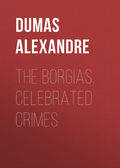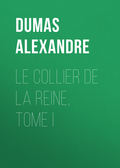
Александр Дюма
Cenci
The confession of the sbirro and the disappearance of Monsignor Guerra left no moral doubt of the guilt of the Cenci. They were consequently sent from the castle to the prison; the two brothers, when put to the torture, broke down and confessed their guilt. Lucrezia Petroni’s full habit of body rendered her unable to bear the torture of the rope, and, on being suspended in the air, begged to be lowered, when she confessed all she knew.
As for Beatrice, she continued unmoved; neither promises, threats, nor torture had any effect upon her; she bore everything unflinchingly, and the judge Ulysses Moscati himself, famous though he was in such matters, failed to draw from her a single incriminating word. Unwilling to take any further responsibility, he referred the case to Clement VIII; and the pope, conjecturing that the judge had been too lenient in applying the torture to, a young and beautiful Roman lady, took it out of his hands and entrusted it to another judge, whose severity and insensibility to emotion were undisputed.
This latter reopened the whole interrogatory, and as Beatrice up to that time had only been subjected to the ordinary torture, he gave instructions to apply both the ordinary and extraordinary. This was the rope and pulley, one of the most terrible inventions ever devised by the most ingenious of tormentors.
To make the nature of this horrid torture plain to our readers, we give a detailed description of it, adding an extract of the presiding judge’s report of the case, taken from the Vatican manuscripts.
Of the various forms of torture then used in Rome the most common were the whistle, the fire, the sleepless, and the rope.
The mildest, the torture of the whistle, was used only in the case of children and old persons; it consisted in thrusting between the nails and the flesh reeds cut in the shape of whistles.
The fire, frequently employed before the invention of the sleepless torture, was simply roasting the soles of the feet before a hot fire.
The sleepless torture, invented by Marsilius, was worked by forcing the accused into an angular frame of wood about five feet high, the sufferer being stripped and his arms tied behind his back to the frame; two men, relieved every five hours, sat beside him, and roused him the moment he closed his eyes. Marsilius says he has never found a man proof against this torture; but here he claims more than he is justly entitled to. Farinacci states that, out of one hundred accused persons subjected to it, five only refused to confess – a very satisfactory result for the inventor.
Lastly comes the torture of the rope and pulley, the most in vogue of all, and known in other Latin countries as the strappado.
It was divided into three degrees of intensity – the slight, the severe, and the very severe.
The first, or slight torture, which consisted mainly in the apprehensions it caused, comprised the threat of severe torture, introduction into the torture chamber, stripping, and the tying of the rope in readiness for its appliance. To increase the terror these preliminaries excited, a pang of physical pain was added by tightening a cord round the wrists. This often sufficed to extract a confession from women or men of highly strung nerves.
The second degree, or severe torture, consisted in fastening the sufferer, stripped naked, and his hands tied behind his back, by the wrists to one end of a rope passed round a pulley bolted into the vaulted ceiling, the other end being attached to a windlass, by turning which he could be hoisted, into the air, and dropped again, either slowly or with a jerk, as ordered by the judge. The suspension generally lasted during the recital of a Pater Noster, an Ave Maria, or a Miserere; if the accused persisted in his denial, it was doubled. This second degree, the last of the ordinary torture, was put in practice when the crime appeared reasonably probable but was not absolutely proved.
The third, or very severe, the first of the extraordinary forms of torture, was so called when the sufferer, having hung suspended by the wrists, for sometimes a whole hour, was swung about by the executioner, either like the pendulum of a clock, or by elevating him with the windlass and dropping him to within a foot or two of the ground. If he stood this torture, a thing almost unheard of, seeing that it cut the flesh of the wrist to the bone and dislocated the limbs, weights were attached to the feet, thus doubling the torture. This last form of torture was only applied when an atrocious crime had been proved to have been committed upon a sacred person, such as a priest, a cardinal, a prince, or an eminent and learned man.
Having seen that Beatrice was sentenced to the torture ordinary and extraordinary, and having explained the nature of these tortures, we proceed to quote the official report: —
“And as in reply to every question she would confess nothing, we caused her to be taken by two officers and led from the prison to the torture chamber, where the torturer was in attendance; there, after cutting off her hair, he made her sit on a small stool, undressed her, pulled off her shoes, tied her hands behind her back, fastened them to a rope passed over a pulley bolted into the ceiling of the aforesaid chamber, and wound up at the other end by a four lever windlass, worked by two men.”
“Before hoisting her from the ground we again interrogated her touching the aforesaid parricide; but notwithstanding the confessions of her brother and her stepmother, which were again produced, bearing their signatures, she persisted in denying everything, saying, ‘Haul me about and do what you like with me; I have spoken the truth, and will tell you nothing else, even if I were torn to pieces.’
“Upon this we had her hoisted in the air by the wrists to the height of about two feet from the ground, while we recited a Pater Noster; and then again questioned her as to the facts and circumstances of the aforesaid parricide; but she would make no further answer, only saying, ‘You are killing me! You are killing me!’
“We then raised her to the elevation of four feet, and began an Ave Maria. But before our prayer was half finished she fainted away; or pretended to do so.
“We caused a bucketful of water to be thrown over her head; feeling its coolness, she recovered consciousness, and cried, ‘My God! I am dead! You are killing me! My God!’ But this was all she would say.
“We then raised her higher still, and recited a Miserere, during which, instead of joining in the prayer, she shook convulsively and cried several times, ‘My God! My God!’
“Again questioned as to the aforesaid parricide, she would confess nothing, saying only that she was innocent, and then again fainted away.
“We caused more water to be thrown over her; then she recovered her senses, opened her eyes, and cried, ‘O cursed executioners! You are killing me! You are killing me!’ But nothing more would she say.
“Seeing which, and that she persisted in her denial, we ordered the torturer to proceed to the torture by jerks.
“He accordingly hoisted her ten feet from the ground, and when there we enjoined her to tell the truth; but whether she would not or could not speak, she answered only by a motion of the head indicating that she could say nothing.
“Seeing which, we made a sign to the executioner, to let go the rope, and she fell with all her weight from the height of ten feet to that of two feet; her arms, from the shock, were dislocated from their sockets; she uttered a loud cry, and swooned away.
“We again caused water to be dashed in her face; she returned to herself, and again cried out, ‘Infamous assassins! You are killing me; but were you to tear out my arms, I would tell you nothing else.’
“Upon this, we ordered a weight of fifty pounds to be fastened to her feet. But at this moment the door opened, and many voices cried, ‘Enough! Enough! Do not torture her any more!’”
These voices were those of Giacomo, Bernardo, and Lucrezia Petroni. The judges, perceiving the obstinacy of Beatrice, had ordered that the accused, who had been separated for five months, should be confronted.
They advanced into the torture chamber, and seeing Beatrice hanging by the wrists, her arms disjointed, and covered with blood, Giacomo cried out: —
“The sin is committed; nothing further remains but to save our souls by repentance, undergo death courageously, and not suffer you to be thus tortured.”
Then said Beatrice, shaking her head as if to cast off grief —
“Do you then wish to die? Since you wish it, be it so.”
Then turning to the officers: —
“Untie me,” said she, “read the examination to me; and what I have to confess, I will confess; what I have to deny, I will deny.”
Beatrice was then lowered and untied; a barber reduced the dislocation of her arms in the usual manner; the examination was read over to her, and, as she had promised, she made a full confession.
After this confession, at the request of the two brothers, they were all confined in the same prison; but the next day Giacomo and Bernardo were taken to the cells of Tordinona; as for the women, they remained where they were.
The pope was so horrified on reading the particulars of the crime contained in the confessions, that he ordered the culprits to be dragged by wild horses through the streets of Rome. But so barbarous a sentence shocked the public mind, so much so that many persons of princely rank petitioned the Holy Father on their knees, imploring him to reconsider his decree, or at least allow the accused to be heard in their defence.
“Tell me,” replied Clement VIII, “did they give their unhappy father time to be heard in his own defence, when they slew him in so merciless and degrading a fashion?”
At length, overcome by so many entreaties, he respited them for three days.
The most eloquent and skilful advocates in Rome immediately busied themselves in preparing pleadings for so emotional a case, and on the day fixed for hearing appeared before His Holiness.
The first pleader was Nicolo degli Angeli, who spoke with such force and eloquence that the pope, alarmed at the effect he was producing among the audience, passionately interrupted him.
“Are there then to be found,” he indignantly cried, “among the Roman nobility children capable of killing their parents, and among Roman lawyers men capable of speaking in their defence? This is a thing we should never have believed, nor even for a moment supposed it possible!”
All were silent upon this terrible rebuke, except Farinacci, who, nerving himself with a strong sense of duty, replied respectfully but firmly —
“Most Holy Father, we are not here to defend criminals, but to save the innocent; for if we succeeded in proving that any of the accused acted in self-defence, I hope that they will be exonerated in the eyes of your Holiness; for just as the law provides for cases in which the father may legally kill the child, so this holds good in the converse. We will therefore continue our pleadings on receiving leave from your Holiness to do so.”
Clement VIII then showed himself as patient as he had previously been hasty, and heard the argument of Farinacci, who pleaded that Francesco Cenci had lost all the rights of a father from, the day that he violated his daughter. In support of his contention he wished to put in the memorial sent by Beatrice to His Holiness, petitioning him, as her sister had done, to remove her from the paternal roof and place her in a convent. Unfortunately, this petition had disappeared, and notwithstanding the minutest search among the papal documents, no trace of it could be found.
The pope had all the pleadings collected, and dismissed the advocates, who then retired, excepting d’Altieri, who knelt before him, saying —
“Most Holy Father, I humbly ask pardon for appearing before you in this case, but I had no choice in the matter, being the advocate of the poor.”
The pope kindly raised him, saying:
“Go; we are not surprised at your conduct, but at that of others, who protect and defend criminals.”
As the pope took a great interest in this case, he sat up all night over it, studying it with Cardinal di San Marcello, a man of much acumen and great experience in criminal cases. Then, having summed it up, he sent a draft of his opinion to the advocates, who read it with great satisfaction, and entertained hopes that the lives of the convicted persons would be spared; for the evidence all went to prove that even if the children had taken their father’s life, all the provocation came from him, and that Beatrice in particular had been dragged into the part she had taken in this crime by the tyranny, wickedness, and brutality of her father. Under the influence of these considerations the pope mitigated the severity of their prison life, and even allowed the prisoners to hope that their lives would not be forfeited.






